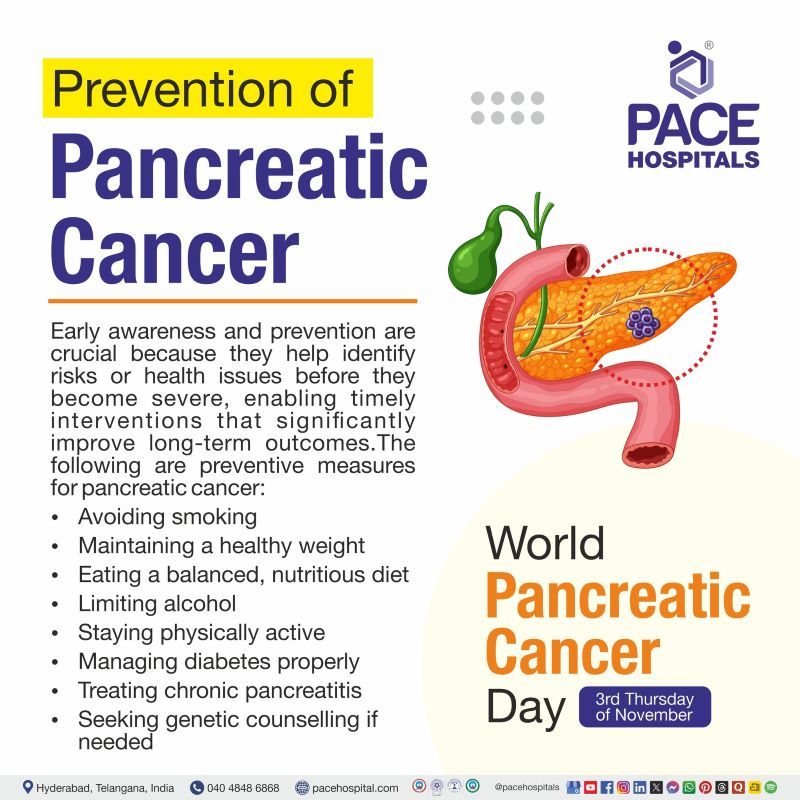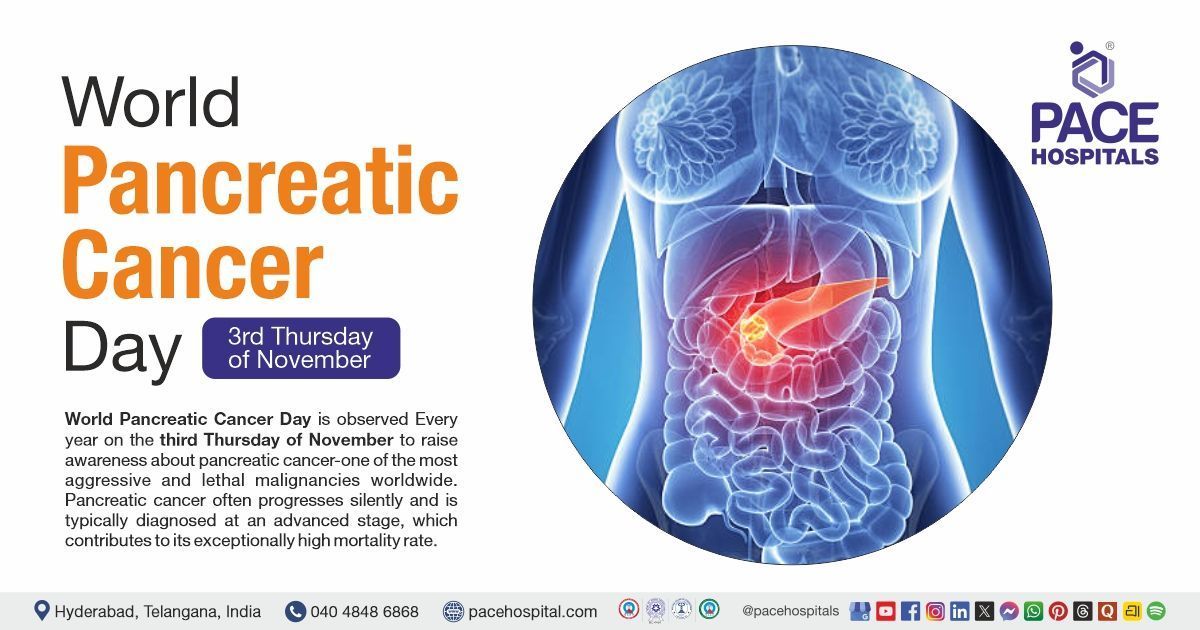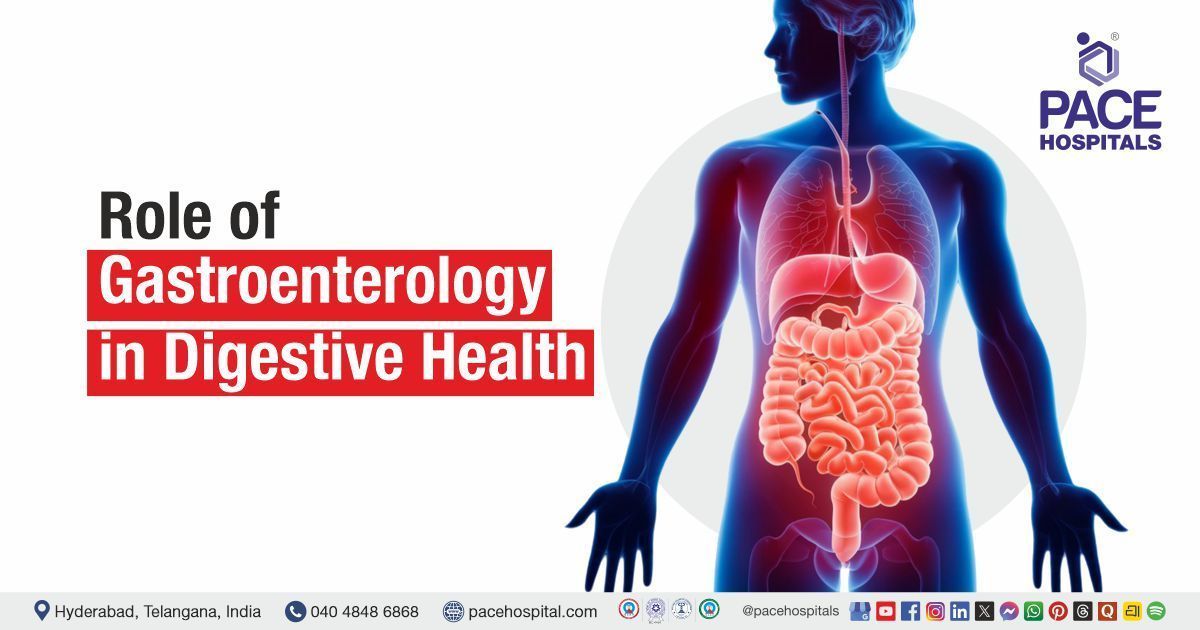World Pancreatic Cancer Day, 20 November 2025 – Theme, History & Importance
PACE Hospitals
Every year, World Pancreatic Cancer Day is observed on the Third Thursday of November to raise awareness about pancreatic cancer, one of the most aggressive and lethal malignancies worldwide. Pancreatic cancer often progresses silently and is typically diagnosed at an advanced stage, which contributes to its exceptionally high mortality rate.
Globally, pancreatic cancer is recognized as a rapidly rising cause of cancer-related deaths. Most patients present with vague or nonspecific symptoms, which can delay diagnosis. As a result, more than 80–85% of cases are found at stages where surgery, the only potentially curative treatment is no longer an option.
Despite advancements in imaging, molecular diagnostics, targeted therapy, and multidisciplinary cancer care, the overall 5-year survival rate remains 13%. Late presentation, aggressive tumor biology, and limited treatment responsiveness are the major factors influencing poor outcomes.
On
World Pancreatic Cancer Day 2025, global health organisations, cancer societies, clinicians, researchers, and patient support groups work together to enhance awareness of early symptoms, reduce diagnostic delays, improve access to specialized treatment, and strengthen support for individuals and families affected by pancreatic cancer.
History of World Pancreatic Cancer Day (WPCD)
World Pancreatic Cancer Day (WPCD) was established to raise awareness of the increasing incidence of pancreatic cancer, a solid tumor that is extremely deadly and frequently progresses quickly and with late diagnosis. The day serves as a reminder of the urgent need to increase awareness, promote early diagnosis, and create more potent treatment alternatives.
The World Pancreatic Cancer Coalition (WPCC), a global network of advocacy groups, research foundations, and patient organizations, saw this need and began the first observance in 2014. The program seeks to increase awareness of clinical and research developments, promote prompt medical evaluation, and enhance interpretation of early symptoms.
Every year on the third Thursday in November, WPCD is observed to coincide with Pancreatic Cancer Awareness Month. The campaign includes educational activities to encourage early detection, public engagement initiatives and illumination landmarks. Purple is a color that represents hope and solidarity.
Today, WPCD serves as a global platform advocating for improved access to specialized care, increased investment in research, and stronger support systems for patients, caregivers, and families affected by pancreatic cancer.
What is Pancreatic Cancer?
Pancreatic cancer is a deadly malignancy of the pancreas, most often pancreatic ductal adenocarcinoma (PDAC), known for rapid spread and resistance to treatment. Early symptoms are subtle but may include abdominal/back pain, weight loss, jaundice, loss of appetite, dark urine, nausea, fatigue, and new-onset diabetes, making awareness essential for timely detection.
Who Is at Risk?
Higher risk is linked to:
- Smoking
- Chronic pancreatitis
- Family history or genetic mutations (BRCA1, BRCA2, CDKN2A, PALB2)
- Type 2 diabetes
- Obesity and inactivity
- Heavy alcohol use
- High intake of processed meats
- Chemical exposure
- Age over 55
People with multiple risk factors may need specialized follow-up.

Prevention of Pancreatic Cancer
Early awareness and prevention are crucial because they help identify risks or health issues before they become severe, enabling timely interventions that significantly improve long-term outcomes.
- Avoiding smoking
- Maintaining a healthy weight
- Eating a balanced, nutritious diet
- Limiting alcohol
- Staying physically active
- Managing diabetes properly
- Treating chronic pancreatitis
- Seeking genetic counselling if needed
Importance and Significance of World Pancreatic Cancer Day
Pancreatic cancer is often referred to as a “silent killer” due to its subtle early presentation and rapid progression. Global awareness campaigns are crucial due to the disease's low survival rates and increasing incidence.
The goals of World Pancreatic Cancer Day are as follows:
- Improve public recognition of early symptoms
- Encourage people to get a medical checkup as soon as possible.
- Promote equitable access to cancer diagnosis and treatment
- Support caregivers and families by providing education and resources
- Promote advancements in research focused on genomics, early detection, and immunotherapy.
- Strengthen palliative care services and improve survivorship support.
By increasing awareness, more patients may receive a diagnosis at a treatable stage, ultimately improving survival outcomes.
Share on
Request an appointment
Fill in the appointment form or call us instantly to book a confirmed appointment with our super specialist at 04048486868
Appointment request - health articles
Recent Articles











